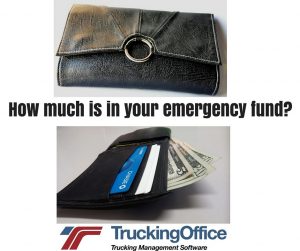 Forget Your Goals? Or Get Derailed By an Emergency?
Forget Your Goals? Or Get Derailed By an Emergency?
Keeping your focus on your goals with reminders or frequent review of your business helps move you forward, but there are days when the road to success has some expensive tolls. Emergencies crop up and we have to pay for them. Do we default to credit cards? Is that our only choice?
I know truckers who have had to make the choice between an entire new engine or buying another rig. My reefer goes bad – do I fix it or replace it? – or go back to working in construction? These decisions get forced on us at crisis points, when we’re on the highways, often far from home with little or no support systems in place. Sometimes it’s just a small amount that would make a difference – a thousand dollars for a couple of tires. Other times, we’re talking about mortgaging our house to cover the costs of repairs.
Emergency Funds
If you listen to AM radio for more than 24 hours in a week, you must hear about Dave Ramsey. When I say this guy is everywhere, I mean it. He’s on the tv. He’s on the radio. He’s in the high schools in the personal finance classes.
I’m not complaining. He’s got a rock-solid financial base for young people to learn how to manage their money. He’s helped millions of people in financial difficulties get back on their feet. Whatever you may think about his particular philosophy (and I know, there are some who don’t like him), he’s got one idea that’s ideal for truckers. The Emergency Fund.
Dave recommends that homeowners keep about $1000 in cash available for emergencies. That’s easier for homeowners than truckers – who’s going to have that kind of cash on hand in their cabs? That’s not even enough money for a trucker to have on hand for an on-the-road emergency repair. In cash? Absolutely not.
Save that emergency fund on a debit card instead.
Keeping that debit card only for emergencies requires a strong will and commitment to not use the money on unnecessary purchases. When you’re out of fuel and out of money, a factoring service may be a better option than breaking out the debit card – unless you’re sure you can pay yourself back right away. You might set up a set of guidelines: debit card for repairs but not for fuel, debit card for emergency overnight hotel bills due to weather but not because you want to watch the NBA finals. Payments to bring it back up to the minimum balance must be made a priority over other optional expenses, just like any other debts.
I think every owner operator should have at least $5,000 available at all times for repairs to their rigs.
Why so much?
One of my truckers had a tire blow out on the road last week. He tried to make it to the next exit to avoid the service call – instead, the tire beside it blew. He was stuck on the side of the road, paying over a thousand dollars for two used tires and the service truck to come out onto the highway. In twenty minutes, a thousand dollar emergency fund would down to nothing – and that’s just a single incident. Add a water pump or fuel pump replacement, or a brake job, and $5,000 might not be very much.
How do owner-operators save up the money? Some companies have a compulsory withholding system that keeps out a minimum amount per settlement or paycheck until the company’s required savings amount is met. Like Dave Ramsey, I’d recommend making small payments to yourself over time to build up your emergency fund. I could save out a percentage of my monthly invoices or a flat rate, but either way, I’m making headway against that debt to myself.
I see it as a debt because if I don’t have cash to make those payments, I’m going to have to put it on credit. That’s a debt. This way I owe myself, not the credit card company. If I have a good month, I can save more toward it and meet my goal sooner.
The biggest problem that stops people from achieving a goal can be the financial barrier. An emergency fund can keep you on the road to reaching your trucking business goals this year.
As an owner operator, we know the risks of buying a rig. That’s one of the reasons we have a maintenance module built right into TruckingOffice. If you can’t keep up with the repairs and the maintenance, you can’t keep your truck on the road. There’s always the chance that something will happen that you can’t predict or prepare for, but for the most part, by taking care of your equipment, you’ll avoid the costly emergency repairs on the road. Want to know more? Take a look at our software for free for 30 days – all the modules, not just part of the program. You’ll see that TruckingOffice trucking management software is the product you need all the time to help prevent maintenance issues from becoming emergencies.






Recent Comments